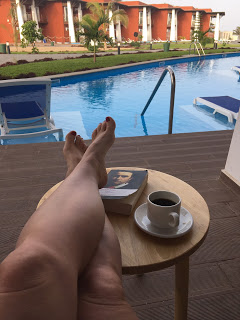Let me tell you, it all goes on in this one. There is bribery, and affairs, and sex addiction, and Brazillian plagues, and that’s before we even get to all the lesbianism, Algerian grain, and unidentified STDS.
Balzac himself vouched for this being pure quality: “It is one of the finest of my finest works,” he noted, modestly.
At the time of writing it, he was apparently pretty pissed, because here he was with all the fine works, meanwhile all the money was being made by some hack who was writing fantastical novels in installments for the newspapers. Thus he decided to get in on the action. He thought he would be fine giving the newspaper 14 days of material and then writing the rest as he went along, for the daily installments. This blew up in his face a bit. He ended up needing to write 16 hours a day and actually sleeping at the presses, which may account for the singularly feverish atmosphere of this book.
Balzac in this novel tells us what he really thinks, and I lost track of all the groups he insulted. Polish people, female people, poor people (especially house servants, who are all thieves), and rich people (Speaking of ugly architecture, he comments: “Money has never lost the least opportunity of showing how stupid it is”). You name it, he slams it.
The plot is almost by-the-by, but there is certainly a lot it. Cousin Bette is a poor relative of a wealthy family. She is consumed with jealousy of them, and while appearing to be their friend actually continually plots their downfall. She doesn’t really need to bother, because the father labours under some kind of sex addiction, entertaining a series of mistresses with money he doesn’t have, and effectively bankrupting himself and his family. His wife knows all about it but does nothing to stop him because she is ‘virtuous’ (?). She is practically the only character in the book that Balzac approves of, apparently because he likes doormats.
Actually thinking on it it is not quite true that he insults everybody. One group he commends. Yes guys, he gives it up for the ‘real artists’ who are:
taxed with aloofness, unsociability, rebellion against the conventions and civilised living; because great men belong to their creations. The entire detachment from all worldly concerns of true artists, and their devotion to their work, stamp them as egoists in the eyes of fools, who think that such men ought to go dressed like men about town performing the gyration that they call ‘their social duties’. People would like to see the lions of Atlas combed and scented like a marchioness’s lapdogs. Such men, who have few peers and rarely meet them, grow accustomed to shutting out the world, in their habit of solitude. They become incomprehensible to the majority, which, as we know, is composed of blockheads, the envious, ignoramuses, and skaters upon the surfaces of life
I think we all know who he includes among the real artists and his initials are HdB.
Anyway, the father eventually gets really carried away, sending his wife’s uncle to raise money for him by cheating Algerians in grain deals. When the swindle is discovered, the uncle needs 200 thousand francs to get out of jail and save his honour; otherwise he will kill himself from the shame The virtuous wife now decides to try and sell herself for the 200K, to save her uncle from suicide, but unfortunately can’t find a buyer. Meanwhile the husband is now really far gone, egged on by Cousin Bette, with a young woman called Madame Marnaffe. Eventually he realizes his folly and is reunited with his family (suffice to say it involves the Brazillian plague I mentioned and Madame Marnaffe’s repentance, of which the latter is even more unlikely than the former).
The reunion doesn’t last long: last look, he is heard promising a chamber maid: “My wife hasn’t long to live, and you can be a Baroness, if you like”. Wife obligingly dies. By this point you are so sick of her you only feel relief.
So there you go: that’s a summary of one of the more unlikely classics of nineteenth century French lit. BOOM. Added bonus, enjoy picture of where I read it, by the pool in the Gambia

